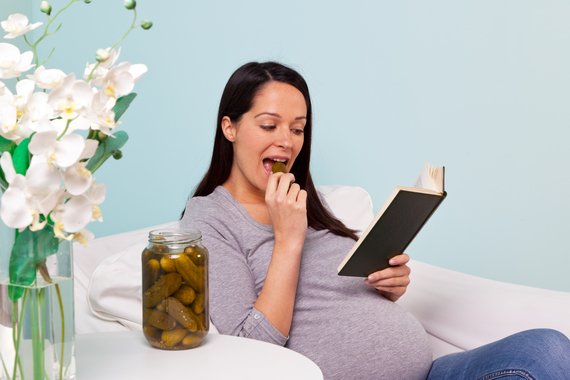By: Kristin Hunt
You know the stereotype: a pregnant woman wakes up at 2am, violently shakes her husband awake, and demands a cheeseburger right this second or she'll name their first-born Skeletor. The threats mostly just happen on Jim Belushi sitcoms (... we hope) but pregnancy cravings are a very real phenomenon. Some 50-90% of American women experience cravings for specific foods during their pregnancies, usually towards the end of the first trimester and into the second.
So what is it that compels women to shove jars of pickles or king-size bars of chocolate into their burgeoning bellies -- especially when some of them hated dills before a fetus arrived on the scene? We hit the books to find out.
Pregnancy cravings could be all in the head
Last year, researchers at Albany suggested cravings might not exist at all. Rather, it's women playing into the popular idea of a ravenous pregnant lady, and justifying "bad behavior" they might otherwise avoid. (The Albany team pointed to previous research that showed women who diet frequently tend to gain more weight than their salad-shunning peers during pregnancy.) This theory is definitely tied with American women, though, because there's a cultural component to pregnancy cravings. Studies have shown that moms-to-be fixate on foods that are readily available. So while a pregnant woman in New York with unfettered access to Reese's might dream of peanut butter cups, her counterpart in Tanzania is going to be on the prowl for yogurt.
But the most popular theories peg them to hormones
As Dr. Omar Manejwala explained in Psychology Today, ghrelin (known colloquially as the "hunger hormone") may influence eating patterns, but the real power player here is neuropeptide Y. NPY is produced in the hypothalamus, and then bounces around the rest of your brain saying, "You are starving! Seek Cheetos post haste!" Research indicates that pregnant women produce more NPY, which would help explain why they crave an insane amount of snacks even before the baby is big enough to really need them.
In the past, scientists suggested that these cravings are a response to a nutritional deficit
But seeing as chocolate and cheeseburgers rarely replenish key vitamins, this theory has been almost universally dismissed.
More from Thrillist:
Like Thrillist on Facebook: www.facebook.com/Thrillist

